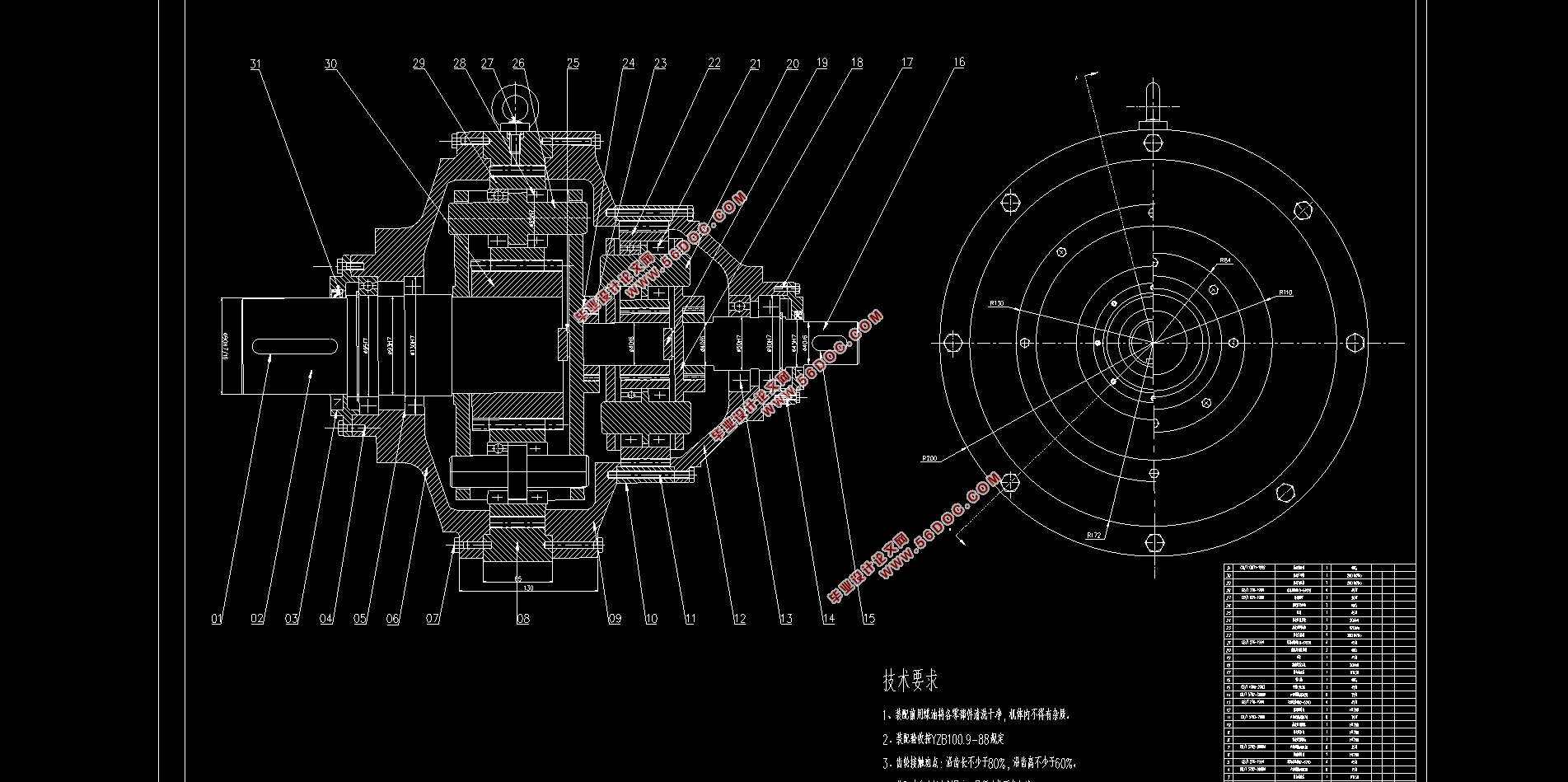新能源汽车双级行星齿轮减速器结构设计(英文版)(含CAD零件装配图)(任务书,开题报告,外文翻译,文献摘要,论文说明书英文版10000字,CAD图5张)
Structural design of double-stage planetary gear reducer for New Energy Vehicle
摘要
由当前时代潮流和国家政策可以看出,新能源汽车是当前汽车发展的主要趋势。对于新能源车来说,因电机本身有极高的转速和扭矩的输出范围的特点,故而变速箱的作用开始被减速器取代。其中,行星齿轮具有同轴性好、质量小、体积小、传动比大、承载能力大以及传动平稳和传动效率高等优点,符合汽车要求。国内外对行星齿轮的各个方向研究均有涉猎,不过,目前大部分的研究都是单级行星齿轮减速器,而双级行星齿轮减速器的研究还很少 。且单级减速器有对驱动要求高,电驱动总成效率低等不足,故该毕业设计开展双级行星齿轮减速器的研究,研究其结构设计方法,提出强度校核计算方法,提高双级行星齿轮减速器的传动性能,促进双级行星齿轮减速其在新能源汽车上的应用具有一定的价值。该文首先针对汽车的使用要求,性能参数进行分析,转换为设计减速器所需数据,再分析双级行星齿轮减速器及其部件的结构型式,确定双级行星齿轮减速器及其部件的结构设计方案,对双级行星齿轮减速器及其部件的设计计算分析并校核,最终绘制出双级行星齿轮减速器装配图和主要零部件图。
关键词:新能源汽车;行星齿轮;二级减速器
Abstract
From the current trend of the times and national policy can be seen,new Energy vehicle is the main trend of current automobile development. For the new energy vehicle, because the motor itself has a very high speed and torque output range, so the role of the gearbox began to be replaced by the reducer. Among them, the planetary gear has the advantages of good coaxiality, small mass, small volume, large transmission ratio, large carrying capacity, stable transmission and high transmission efficiency, which meet the requirements of the automobile. At home and abroad, there are many researches on the planetary gear reducer, but most of them are single-stage planetary gear reducer, and the research on double-stage planetary gear reducer is very few. In addition, the single-stage reducer has some disadvantages such as high requirements for driving and low efficiency of electric drive assembly. Therefore, this graduation project carries out the research on the double-stage planetary gear reducer, studies its structure design method, and puts forward the strength checking calculation method It is valuable to improve the transmission performance of two-stage planetary gear reducer and promote its application in new energy vehicles. In this paper, first of all, the performance parameters of the automobile are analyzed, then the data needed for the design of the reducer are converted, and then the structural types of the two-stage planetary gear reducer and its components are analyzed To determine the structural design scheme of the two-stage planetary gear reducer and its components, and to analyze and check the design calculation of the two-stage planetary gear reducer and its components, finally, the Assembly drawing and the main parts drawing of the two-stage planetary gear reducer are drawn.
Key Words: New Energy Vehicle; Planetary Gear; two-stage reducer


Contents
Chapter One Introduction 1
1.1 Research background 1
1.2 Research Status at Home and Abroad 3
1.2.1 Research status of China 3
1.2.2 Research Status of Abroad 5
1.3 Overview of the research 6
1.3.1 Main research contents 6
1.3.2 Summary of each paragraph 7
Chapter Two Establishment of the Overall Scheme of Planetary Gear Reducer 8
2.1Basic condition and definition of planetary gear transmission 8
2.2Selection of planetary gear trains 9
2.3Tooth fitting calculation 10
2.4Primary calculation of main parameters of gear 10
2.4.1 Calculate module M of high speed gear 11
2.4.2 Calculate gear module M of low speed stage 11
2.5Calculation of meshing parameters 12
2.5.1 Calculation of meshing parameters of high-speed stage 12
2.5.2 Calculation of meshing parameters of low-speed stage 12
2.6Calculation of geometric size 13
2.6.1High-speed stage 13
2.6.2Low-speed stage 14
2.7Checking calculation of assembly condition 14
2.7.1Adjacency condition 14
2.7.2 Concentric condition 15
2.7.3Installation conditions 15
2.8Calculation of transmission efficiency 15
2.9Checking the strength of gear transmission 18
2.9.1Fatigue strength check of high-speed gear 18
(2)B-C gear pair: 21
2.9.2Fatigue strength check of low-speed gear 23
Chapter Three Axle 28
3.1Input axle 28
3.2 Output axle 29
3.3 Check and analysis of drive shaft 29
3.4 Planetary terminal 31
Chapter Four Other Structure 33
4.1Internal gear 33
4.2Planetary gear design 33
4.3Design of rotating arm 34
4.4 Design of box body 35
4.5 Deep groove ball bearings 36
4.6Flat key 37
Chapter Five Summary and Outlook 39
5.1 Full text summary 39
5.2 Innovations in this article 39
5.3Research outlook 39
References 40
Acknowledgement 42
|





